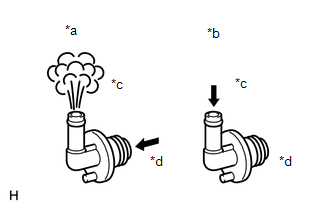Toyota Yaris: Brake Booster / Inspection
INSPECTION
PROCEDURE
1. INSPECT BRAKE VACUUM CHECK VALVE ASSEMBLY
| (a) Check that there is ventilation from the booster side to the engine side, and no ventilation from the engine side to the booster side of the brake vacuum check valve assembly. HINT: If the result is not as specified, replace the brake vacuum check valve assembly. |
|
 Removal
Removal
REMOVAL CAUTION / NOTICE / HINT The necessary procedures (adjustment, calibration, initialization or registration) that must be performed after parts are removed and installed, or replaced during brake booster assembly removal/installation are shown below...
 Reassembly
Reassembly
REASSEMBLY PROCEDURE 1. INSTALL VACUUM SENSOR ASSEMBLY (a) Install a new vacuum sensor grommet to the brake booster assembly. (b) Install the vacuum sensor assembly to the brake booster assembly as shown in the illustration...
Other information:
Toyota Yaris XP210 (2020-2026) Reapir and Service Manual: Utility
U..
Toyota Yaris XP210 (2020-2026) Reapir and Service Manual: Disassembly
DISASSEMBLY PROCEDURE 1. REMOVE HOOD INSULATOR (a) Remove the 4 clips. (b) Disengage the guides to remove the hood insulator. 2. REMOVE HOOD STAY HOLDER (a) Disengage the claws to remove the hood stay holder. 3. REMOVE HOOD SUPPORT ASSEMBLY (a) Disengage the claws to remove the hood support assembly...
Categories
- Manuals Home
- Toyota Yaris Owners Manual
- Toyota Yaris Service Manual
- To Set Speed
- G16e-gts (engine Mechanical)
- Brake System Control Module "A" System Voltage System Voltage Low (C137BA2)
- New on site
- Most important about car
Break-In Period
No special break-in is necessary, but a few precautions in the first 600 miles (1,000 km) may add to the performance, economy, and life of the vehicle.
Do not race the engine. Do not maintain one constant speed, either slow or fast, for a long period of time. Do not drive constantly at full-throttle or high engine rpm for extended periods of time. Avoid unnecessary hard stops. Avoid full-throttle starts.
Copyright © 2026 www.toyaris4.com

